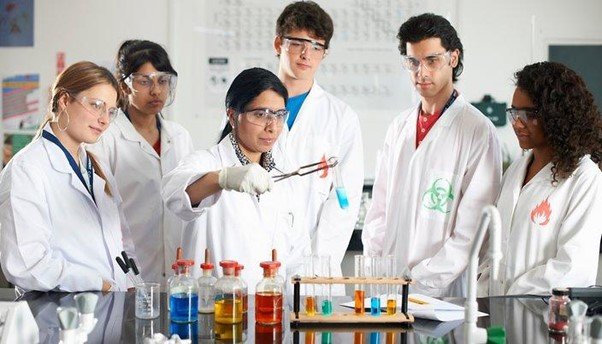Selecting the best pharmacy colleges an important choice that will influence your future in the pharmaceutical sector and the course of your career. It can be difficult to choose the finest school for your D.Pharma Diploma in Pharmacy or B.Pharma Bachelor of Pharmacy) because there are so many possibilities accessible. In order to assist you in navigating the process and coming to an informed conclusion, this article attempts to offer an in-depth explanation.
Knowledge of B.Pharm and D.Pharm
It’s critical to understand the key differences between B.Pharm and D.Pharm courses before digging into the selection criteria for pharmacy colleges.
The four-year B.Pharma undergraduate programme focuses on pharmacology, the science of drug discovery, and the function of pharmacists in the medical field. Graduates of B.Pharma colleges can begin work in a variety of industries, including as pharmaceuticals, healthcare, and research, or seek further education in pharmacy or related subjects.
In contrast, the two-year D.Pharma course trains students for positions as pharmacy assistants or technicians. Graduates of D.Pharma courses receive instruction in the fundamentals of pharmacy practice, which includes patient care and prescription delivery.

Important Things to Take Into Account When Selecting a Pharmacy College:
Accreditation and Recognition
Verify that the college has been approved by the appropriate educational authorities and is accredited by the Pharmacy Council of India (PCI). Employers and other educational institutions will respect your degree if the institution is accredited, which ensures that it satisfies standards of excellence.
Coursework and Areas of Expertise
Examine the courses that the pharmacy colleges are offering. Seek for a course that offers a good balance between lectures and practical training. Specialisations or elective courses in clinical pharmacy, industrial pharmacy, or pharmaceutical management may be offered by some colleges, which can provide them an advantage in particular career routes.

Infrastructure and Faculty
The standard of the instructors and facilities can have a big influence on how well you learn. Verify the instructors’ qualifications and background. For learning and research to be conducted effectively, it is essential to have access to the newest technology, well-stocked libraries, and modern laboratories.
The standard of the instructors and facilities can have a big influence on how well you learn. Verify the instructors’ qualifications and background. For learning and research to be conducted effectively, it is essential to have access to the newest technology, well-stocked libraries, and modern laboratories.
Partnerships with the Industry and Opportunities for Internships
Strong linkages between colleges and the pharmaceutical sector may result in excellent internship opportunities, which are crucial for obtaining real-world experience. Internships assist in developing a professional network and can result in employment offers.
Placement Data and Alumni Achievements
Examine the placement history of the college and the achievements of its former students. Successful alumni and high placement rates are signs of the school’s standing and the calibre of its curriculum.
Campus Life and Location
Your entire experience at the college may be impacted by its location. Take into account elements like the cost of living, the atmosphere in general, and the distance from pharmaceutical hubs. Your college experience can also be enhanced by a bustling campus life that offers clubs, organisations, and extracurricular activities.
A Comparison of B.Pharm and D.Pharm
Take your career objectives and the amount of time you are willing to devote to your studies into account when choosing between a B.Pharm and a D.Pharma course.

B.Pharm works best if
Your goal is to advance in the pharmaceutical sector.
You intend to continue your research or postgraduate study.
You’re drawn to positions requiring in-depth knowledge of regulatory affairs and medication development.
D.Pharm works well if
You want to get some real-world experience and jumpstart your career.
You want to work as an assistant or pharmacy technician, for example.
You’re searching for a programme that is more affordable and lasts less time. development and is in line with your career goals.
You may make an educated choice that will lead to a fruitful and satisfying career in pharmacy by taking these things into account and doing your research.
What factors should you take into account when selecting B Pharma institutions for your training?
A few things to think about when selecting B Pharma colleges include infrastructure, industry ties, faculty, curriculum, accreditation, and placement history. The Pharmacy Council of India (PCI) accreditation guarantees both the college’s quality requirements and the recognition of your degree. A full education requires a curriculum that is extensive and strikes a balance between academic knowledge and hands-on training. The learning environment is further improved by knowledgeable instructors and cutting-edge labs and libraries, among other contemporary amenities. Industry relationships are crucial for supplying worthwhile internship opportunities, which are necessary for obtaining practical experience and enhancing employment prospects. Assessing placement statistics and alumni achievements can also be useful in determining the reputation of the college and the quality of its curriculum.
How can you find the top D Pharma colleges according on your desired career path?
Check out universities with good teaching, strong practical training programmes, and strong industry links to determine which D Pharma colleges are the best. In order to prepare students for immediate employment as pharmacy technicians or assistants, D Pharma courses should provide practical experience. The Pharmacy Council of India (PCI) accreditation is essential for guaranteeing that the instruction offered satisfies national requirements. Examine the college’s facilities, such as its labs and library, to make sure they facilitate all-encompassing education. Internship opportunities and industry connections are essential for improving employability and getting real-world experience.
Why is accreditation significant in the process of choosing D Pharma and B Pharma colleges?
When choosing between B Pharma and D Pharma colleges, accreditation is essential since it guarantees that the school satisfies the high requirements established by the Pharmacy Council of India (PCI). Employers and other educational institutions will recognise and value the education you obtain thanks to this recognition. Accredited pharmacy colleges guarantee that you receive a thorough and up-to-date education by offering a curriculum that is continually evaluated and revised to meet industry requirements.
What part does the curriculum have in selecting the best college of pharmacy?
A key aspect to take consideration when selecting pharmacy colleges for B.Pharm or D.Pharma degrees is the curriculum. A strong curriculum for B Pharma colleges should integrate academic understanding with real-world application in subjects like pharmaceutical chemistry, pharmaceutics, and pharmacology. The curriculum at D Pharma colleges should put an intense focus on imparting the practical knowledge and hands-on training required for positions as pharmacy assistants or technicians. A well-rounded education improves students’ preparation for the workforce and equips them for a variety of professional choices in the pharmaceutical sector.
In summary
One of the most important steps to a successful career in the pharmaceutical industry is selecting the correct pharmacy college. Make sure you thoroughly investigate and assess your selections in light of accreditation, curriculum, industry links, professors, placement history, and campus culture. Whether you decide on a D.Pharma or a B.Pharma courses, be sure the college you select supports your professional.








